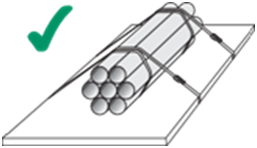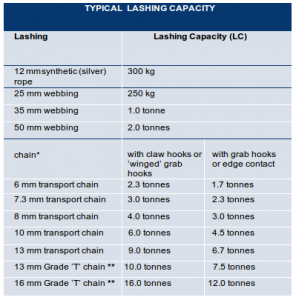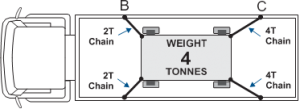This is a guide only, please check your local regulations and rules for upto date information.
Download the factsheet from here .. Light vehicle towing trailer regulations
Load Restraint Guide .. Available here
Trailer load safety
When loaded, the centre of mass of a drawbar trailer, including its load, must be in front of the centre of the axle group, to minimise trailer sway (see Figure B.9). This means that the trailer coupling should push down on the towbar, not exceeding the manufacturer’s ratings of the coupling and towbar.
![]()


![]()



A simple rule is to select lashings whose combined lashing capacity is:
- in the forward direction = twice the weight of load;
- in the sideways direction = the weight of load; and
- in the rearward direction = the weight of load.
This assumes the lashings are angled at less than 60 degrees to the appropriate direction of movement. However, lashings selected in this way will, in most cases, be stronger than necessary.
For example, to restrain a weight of 4 tonne (see Figure C.18) the following is required:
- in the forward direction, two chains (C & D) which are angled at 60 degrees or less to the rearward direction each with a lashing capacity of 4 tonnes;
- in the sideways direction, two chains (B & C or A & D) which are angled at 60 degrees or less to the sideways direction each with a minimum lashing capacity of 2 tonnes;
- in the rearward direction, two chains (A & B) which are angled at 60 degrees or less to the forward direction each with a lashing capacity of 2 tonnes.

For a complete guide on tie down a load on a small trailer or big trailer remains the same following the NATIONAL TRANSPORT COMMISSION National Restraint Guide you can never go wrong.
